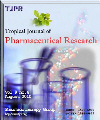
|
Tropical Journal of Pharmaceutical Research
Pharmacotherapy Group, Faculty of Pharmacy, University of Benin, Benin City, Nigeria
ISSN: 1596-5996
EISSN: 1596-5996
Vol. 13, No. 10, 2014, pp. 1593-1600
|
 Bioline Code: pr14219
Bioline Code: pr14219
Full paper language: English
Document type: Research Article
Document available free of charge
|
|
|
Tropical Journal of Pharmaceutical Research, Vol. 13, No. 10, 2014, pp. 1593-1600
| en |
Formulation and Evaluation of Two-Pulse Drug Delivery System of Amoxicillin Trihydrate
Kumar, Rohitash; M.S., Anvesh; Khan, Mohammed S.; Moin, Afrasim & D.V., Gowda
Abstract
Purpose: To develop a pH-controlled two-pulse drug delivery system of amoxicillin in order to
overcome the snag of biological tolerance and to improve bactericidal activity.
Methods: The core tablets were compressed and coated with hydroxylpropyl methylcellulose (HPMC)
of different viscosities with spray-dried lactose (SDL) as a pore former. The final two-pulse release
tablet was prepared with the remaining drug fraction (to be released as the first immediate release
pulse) with a disintegrant, giving the final tablet. The tablets were evaluated for pharmaceutical
properties including disintegration, thickness, hardness, friability and weight variation and by DSC
(differential scanning calorimetry) and FTIR (Fourier transform infrared spectroscopy) studies in order to
assess drug/polymer compatibility. The tablets further subjected to in vitro dissolution studies and
stability studies.
Result: The tablet core disintegrated within 30 to 40 s. Drug content ranged from 97.85 to 98.23 %.
FTIR and DSC studies showed drug-polymer compatibility. The developed two-pulse release tablets
had acceptable thickness, hardness, friability and weight variation. In vitro drug release showed
prolongation of lag time as polymer viscosity increased. With 25 % HPMC and 75 % SDL, drug release
was 97.5 % by the end of 8th , 9th &10th h and viscosity was 100, 400 and 4000 cps respectively. No
significant difference in drug release was found as values were within limits of confidence interval (p <
0.05). The formulation was stable.
Conclusion:The developed formulation demonstrates the feasibility of a two-phase release of
amoxicillin separated by a well-defined time-controlled lag phase which is desirable for
chronotherapeutic drug delivery.
Keywords
Two-pulse drug delivery; Chronotherapeutic drug delivery; Bacterial drug resistance; Amoxicillin
|
| |
© Copyright 2014 - Tropical Journal of Pharmaceutical Research
Alternative site location: http://www.tjpr.org
|
|
